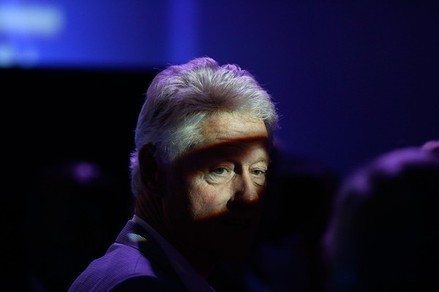
And so to my final blog piece about Re|source 2012: Bill Clinton’s speech.

Source: Getty Images
What can you say about the man, the legend?
The man who has felt more ladies knicker elastic than Marks & Spencer’s head underwear tester.
No, that’s not important.
You know, I was amazed about the reverence, excitement and awe there was around the Oxford University hall as Clinton walked in.
The audience comprised a select few academics, professors, politicians, bankers, hedge fund managers and captains of industry, and they were all obviously eager to hear every word and nuance of Clinton’s speech … including me.
Looking slim and grey, Clinton was dressed in an immaculate summer light tan suit and shoes, and was at ease from the minute he arrived to the minute he left.
Chatting with many of the audience, joining in the dialogue, generally chin-wagging … not at all the aloof sort of speaker you might imagine his alumni to be (take note Tony and Peter).
So this was the big shot and the big moment. The closing keynote. What would he say?
Well, he said a lot.
The BBC and Guardian summed it up quite well so, rather than writing my own summary, I’ve cheated and filched theirs. No point in re-inventing the wheel is there?
From the BBC:
Former US President Bill Clinton has called for more to be done to persuade voters to support schemes that tackle global warming and resource scarcity.
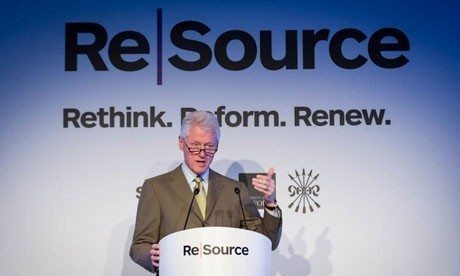
Source: Getty Images
Speaking in Oxford at the Resource 2012 forum, he said "the whole consciousness of a significant number of voters" had to be altered.
"People are not stupid... they may not know, but they are not dumb."
It would enable governments to make the required long-term decisions that may be difficult in the short-term.
"You have to be prepared to pay the price of time if you want to change the ark of history," said the former president.
"What we do not know is whether we can move quickly enough to avoid calamitous climate change and resource depletion. I for one am glad we don't know.
"If we knew for sure we could, we'd get lazy and push it back to the last minute. If we knew we couldn't, we'd do the immoral thing and stop trying."
'Action model'
Turning his attention to the most affordable ways to tackle global warming, Mr Clinton highlighted the need to make existing buildings more energy-efficient, investing more in solar energy, cleaning up landfill sites, and introducing cleaner cooking fuels in India and other countries in the developing world.
He said this and all other efforts required governments, businesses and non-government organisations all working together.
"My view on this is that the best models of action have all three groups doing what they should do," said the former president.
Regarding the situation in the US, he said opinion had "come a long way" since 1997, when the US Senate rejected the Kyoto Agreement on climate change by a unanimous vote of 95-0.
President Clinton said: "At that moment the prevailing opinion in America was that no country could stay rich or get wealthy if they did not put more greenhouse gases into the air... There are still some people in America who believe that, but most don't."
From the Guardian’s live blog:
5.07pm: Bill Clinton speech
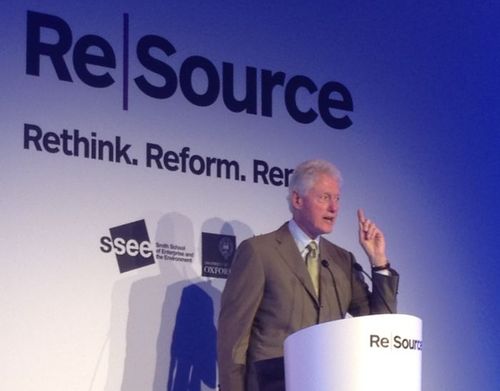
Clinton on optimism and the need to raise the consciousness of the world
Bill Clinton has said the most important change that needs to happen to confront the sustainability challenges of our age is to raise the consciousness of the world's population.
He said he did not know if we will be able to avoid the calamitous effects of climate change and resource scarcity, but that humanity had shown in the past that it was able to "slip the noose."
Clinton suggested it was better not to know what lies ahead because if we do think we have more time than we think, we would wait till the last moment to act, and if it is already too late, then we would stop even trying.
"I always see the glass as half full as pessimism is an excuse for inaction," he said. "It will not help you to wake up in the morning. People need to look forward to something and it is foolish to be pessimistic or wildly optimistic."
Referring to whether civilisation will survive in its current form, he said that "every time we have got close in the past we have slipped the noose. I think it is more than luck. I think it is an intuitive instinct for survival."
Clinton said the future would only be bright if we collaborate more, rather than seeing each others differences.
Pointing to the human genome, he said: "If you look round this room, differences in race, gender and body shape are rooted in one half of one percent of your genes but 99.5 per cent of thinking about how we are different.
"What we need is a different level of consciousness that weighs in a different way the competing claims of he common good and private gain, co-operation and conflict, of yesterday and tomorrow."
6.09pm:
Clinton on how change can come in small steps and how passion is the most important agent of change
Bill Clinton yesterday called on people not to be disheartened by the lack of decisive change at a global level and said that numerous small steps could create the foundation for more radical action in the future.
He said that thankfully even the United States now realised that the ability to create wealth was not predicated on consuming ever more and pumping more emissions into the atmosphere.
"You have to grab what you can and get on with it," he said. "Even things that seem small may have an impact on consciousness and what may be possible. One little thing to do is more important than a big speech
"We have come a very long way but nobody knows yet whether we will avoid the most calamitous damage."
He pointed to the work of the C40 group of cities, which now encompasses 58 cities containing 8% of the global population, for not waiting for multilateral negotiations to succeed before taking action.
He said that the C40 had not undertaken nearly 50000 specific projects working on building retrofits, clean energy, lighting and reforestation.
"Good government policies can make a big difference but if there are not here, there is still a lot that can be done," said Clinton.
"Whether we do what we are supposed to do means changing the consciousness of a significant portion of voters.
"Everyone can and should do something and the power of example is vital, but concrete examples is not something much to celebrate. It's not newsworthy because there is no blood on the floor."
However, Clinton did bemoan the fact that politicians were not showing enough passion, and that this was often the more powerful weapon.
"The real problem is that there is not enough informed passion," he said. "There are lots of opportunities to be very far sighted in the political system.
"In competitive political situations, money is on the side of yesterday and tomorrow needs enough passion and information.
"It is a mistake to say is it business or government or NGOs. In my view, the best models of action have all three gorps doing what they can do."
Clinton said it was most important to pick the low hanging fruit, and said most important of all was energy efficiency and its ability to create employment.
He gave the example of the 870 jobs created from building a coal fired power station to the 7,000-8,000 jobs created from retrofitting buildings.
Secondly, he said that solar should be developed as a renewable resource and that we should concentrate on seeking to slow the progress of climate change by concentrating resources on attacking more rapidly dispersing greenhouse gases such as methane.
He said that if new research were to prove accurate, this dispersal could slow the rate of warming in the next few decades by half. " If this is true, we should all be in favour of this."
Clinton heaped praise on the president of Costa Rica for refusing to allow oil companies to drill for oil, even though there were likely to be large reserves both on land and off the coast, asking which other president in the world would take such action.
While it was important to take political decisions, Clinton said the process of change was equally important. "One of reasons Costa Rica works is they have worked for decades making sure everyone is heard.
"They understand how they are connected. The decision matters but the process can matter more to keep it going over the long term."
Clinton said one excellent example of stakeholder engagement was how President Obama had worked to agree transforming the efficiency of the American car industry, by bringing together labour, management, government and environmental groups. He said this would not only create 150,000 high tech jobs but also significantly reduce fuel use.
He said that while the different stakeholders had disagreements, they had met with the goal of reaching a consensus and this was the critical ingredient that is needed for effective change.
"We have got to get back to a stakeholder society where one stakeholder does not get an advantage from the skin they put in the game," he said.
Clinton pointed out that collaboration was equally important on the global stage but that there would only be peace between countries if there was a recognition of the need to share the world's resources.
"Either we have a policy of shared benefits and responsibility. or we act as though each struggle is a zero sum game."
From the Guardian paper:
Former president says US would recover faster from financial crises if more effort was made to use resources sustainably
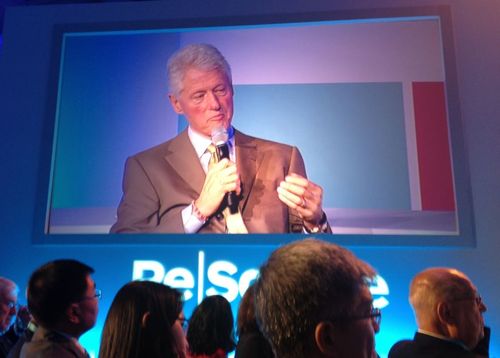
Bill Clinton has warned that the US needs to cut its consumption of natural resources if it is to stave off the threats of climate change and rising prices.
The former president said the economy of the world's biggest consumer would recover faster from the recession and financial crises if more effort was made to use resources sustainably.
"We can grow even faster if we use less energy," said Clinton in a conversation with the Guardian at the Resource 2012 conference in Oxford on Friday evening. "We have studies that show this. All that we need to do is find ways to finance this."
He said the current financial system favoured the building of major projects such as coal-fired power stations, despite their energy intensity, because the value of energy efficiency was underrated.
Big financial backers are used to weighing up the finances of major infrastructure works, because they have long developed the financial models to work out the payback on their investment over the project's lifetime.
But financing efficiency projects is more complex, and has received much less attention from investors, because the payback is spread more diffusely – among thousands of companies and individuals.
"This is the problem with going aggressively for efficiency, as we need to," Clinton said. "If I want to finance efficiency savings, I need to go to lots of people and add all those savings together. But if I want to build a new coal-fired power station, I go to a few [backers] and I've done it."
Clinton also called for countries to make much more effort to cut greenhouse gases other than carbon dioxide, which has received most international attention.
He said there were easy gains to be made by cutting methane – for instance, by capping off or reusing the methane resulting from landfill rubbish disposal sites – and "black carbon", or soot, arising from inefficient industrial installations or cooking fires.
He said that despite the failures of successive governments – including his own 1992-2000 administration in the US – to forge working treaties on climate change, and to cut greenhouse gas emissions, people should take the initiative by working together and individually to reduce their own impact on the environment. He pointed to the work of the biologist EO Wilson, whose most recent work suggests that human beings and other complex natural societies prosper through co-operation. "I believe that in a complex world … these creative networks of co-operation have to triumph over conflict-driven models," said Clinton.
And finally, from the twitterati:
Harriet Taylor @Haataylor
Very excited to see clinton in Oxford at #resource2012
Re|Source2012 @ReSource2012
President Bill Clinton takes to the stage for his closing keynote at #resource2012
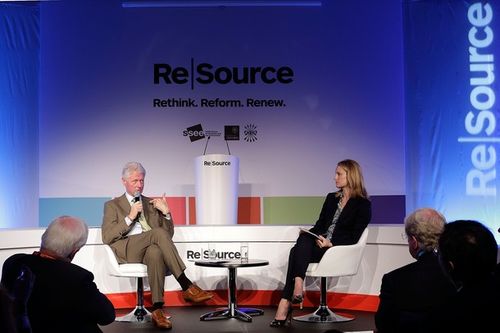
Chris Skinner @Chris_Skinner
“You have to be prepared to pay the price of time if you want to change the ark of history.”
roger harrabin @RogerHarrabin
“We don’t know for sure we can solve climate change and resource efficiency - that's good. If we knew we'd get complacent.”
Chris Skinner
“Businesses that adopt a sustainability model are more efficient than those who don't.”
Re|Source2012
“Best models of action have businesses, govts & NGOs working together at what they do best.”
kamuhinda @kamuhinda
“Innovation for the future needs passion; use power of demonstration to convince.”
Chris Skinner
“A major growing issue is air conditioners in middle class homes in India that are not subject to int'l limits.”
Stephen Gee @Stephengee
Bill Clinton says “landfills are gold mines!!” “ending landfill is simply about investment”
Chris Skinner
Climate change good news: you can take a boat across the North Pole in the summertime. Bad news: you can take a boat ...
Chris Skinner
Clinton telling stories about projects in Costa Rica, Maldives, Tanzania, Haiti. Sustainability rocks when brought to life
Chris Skinner
“The aggregate weight of all the ants on Earth is greater than the aggregate weight of all humans.”
Re|Source2012
Sustainable growth not just top-down process, value of efficiency must be shared with local communities too - Bill Clinton
roger harrabin
BC’s tips: efficiency/retro-fits; buy solar cos cheap; cut non CO2 ghgs; close landfills; help people co-operate, compromise
roger harrabin
Clinton: Some day we may have decide that the common good is greater than the private gain. Hmm - wonder when that might be?
Paul Druckman @pauldruckman
Clinton says financial industry to move away from quarterly to longer time horizon investing profile
madano partnership @madano
It's energy efficiency stupid... Bill Clinton calling on picking the low hanging fruit.
Akshat Rathi @AkshatRathi
Bill Clinton at #resource2012 asks can we learn to live with the truth of our past? To deal with climate change, it's the only way ahead.
Re|Source2012
Bill Clinton – actions that may seem small against magnitude of problem can have impact & act as a catalyst for further change
Chris Skinner
Clinton candidly taking Q&A. Says finance needs to start to focus on the long-term. See the Long Now. http://thefinanser.co.uk/fsclub/2010/11/the-long-blog-about-the-long-now
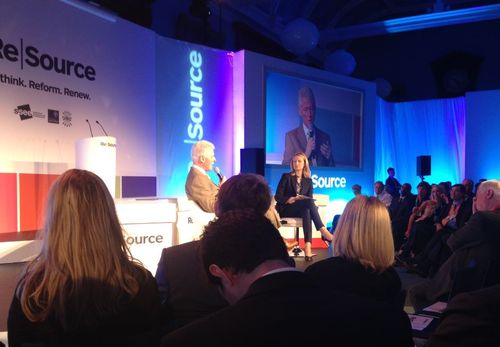
Chris Skinner
We need a positively shared future . http://twitter.com/Chris_Skinner/status/223808676559982593/photo/1
Akshat Rathi
Q: Politician's think of the next election, a statesman of next generation. How can we build a statesman?
Akshat Rathi
Clinton quotes Truman: A statesman is a dead politician.
Paul Druckman
...and finally President Clinton says ““Pessimism is an excuse for in activism”
Zac Goldsmith @ZacGoldsmith
Bill Clinton: “small farms have been way undersold in terms of their ability to feed the world and take care of the env”
Chris Skinner
Being pessimistic is dumb. Be optimistic. It makes getting up in the morning much more fun.
Re|Source2012
Bill Clinton – must be optimistic in ability to react & adapt to resource scarcity. Pessimism only an excuse for inertia
This is the third of three blog posts about Re|Source 2012 (part one here and part two here). In addition, there is an official write-up of Clinton's speech here.
Chris M Skinner
Chris Skinner is best known as an independent commentator on the financial markets through his blog, TheFinanser.com, as author of the bestselling book Digital Bank, and Chair of the European networking forum the Financial Services Club. He has been voted one of the most influential people in banking by The Financial Brand (as well as one of the best blogs), a FinTech Titan (Next Bank), one of the Fintech Leaders you need to follow (City AM, Deluxe and Jax Finance), as well as one of the Top 40 most influential people in financial technology by the Wall Street Journal's Financial News. To learn more click here...

